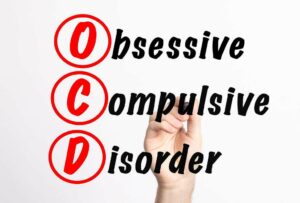It’s not uncommon for people to experience obsessive-compulsive disorder (OCD) symptoms during their childhood. In fact, up to one-third of all children who have OCD experience some type of trauma in their lives. This could be anything from being bullied at school to being physically or sexually abused. If you’re wondering if your OCD might be linked to a traumatic experience in your past, keep reading. In this blog post, we’ll explore the link between OCD and childhood trauma, and we’ll offer some tips for overcoming it.
Contents
What Is OCD?

OCD is a mental health disorder that is characterized by intrusive, unwanted thoughts (obsessions) and the urge to perform repetitive behaviors or rituals (compulsions). People with OCD often experience extreme distress and anxiety, as they cannot control their obsessions and compulsions.
OCD is often triggered by stress or traumatic events such as childhood trauma. Research has found that people with OCD are more likely to have a history of trauma than those without OCD.
Understanding the Link Between Childhood Trauma and OCD
Childhood trauma is often defined as any event or experience that is emotionally painful and overwhelming for a child. This can include physical, sexual, or emotional abuse; neglect; parental loss or separation; traumatic losses such as death or divorce; bullying; and more.
Research has suggested that childhood trauma can lead to long-term changes in brain chemistry and structure, making people more vulnerable to developing mental health disorders later on in life, including OCD. Studies have found that individuals with OCD are twice as likely to report a history of childhood trauma than those without OCD.
While the exact cause of OCD remains unknown, it is believed that in people with a history of childhood trauma, traumatic experiences can trigger a disruption in the delicate balance between different brain chemicals and structures, leading to changes in behavior that are characteristic of OCD. In particular, these changes involve the hippocampus (which deals with memories) and the amygdala (responsible for emotions).
When these two areas are not in balance with each other, it can result in someone struggling to regulate their emotions and process their memories properly. This manifests as intrusive thoughts or compulsive behaviors which characterize OCD. A person may feel overwhelmed by fear or shame and may resort to compulsions such as cleaning or checking as a way to cope with these feelings.
It is important to note that experiencing childhood trauma does not guarantee one will develop OCD, but it can certainly increase the risk of developing this disorder. If you have experienced childhood trauma and are struggling with obsessive-compulsive behaviors, seeking professional help is vital to manage your symptoms effectively.
How Can OCD and Childhood Trauma Impact a Person Negatively?

The impacts of OCD and childhood trauma can be far-reaching and devastating. People who experienced both often struggle with feelings of insecurity, low self-esteem, anxiety, and depression. Symptoms of OCD such as compulsions to repeat routines or rituals may become a way to cope with the emotional distress due to traumatic experiences in the past. Furthermore, it is not uncommon for people with OCD to excessively worry about potential harm coming their way in adulthood as a result of unresolved issues from their childhood.
On top of this, individuals living with both disorders may have difficulty forming healthy relationships due to mistrust stemming from earlier traumas. This can lead them to have trouble connecting with others which can further increase feelings of isolation. As a consequence of all these difficulties, those affected are at higher risk of developing other mental health issues.
Other impacts can be seen in the person’s day-to-day life. People who have both disorders may struggle to keep up with daily tasks due to their obsessions and compulsions taking over, leading to problems such as missing work or school. They might also find it difficult to navigate through social situations because of the anxiety that comes with OCD and past traumas.
Overall, it is important to understand the link between OCD and childhood trauma to be able to assess how it can affect an individual’s life and provide them with effective treatment options. With the right support, people affected by this combination of conditions can lead happy, fulfilling lives.
Can You Prevent OCD and Childhood Trauma?

Parents should strive to create a safe and secure environment for their children from infancy onward. This includes providing proper nutrition, appropriate medical care, and psychological support during difficult times, fostering positive relationships with family members, friends, and peers; and teaching problem-solving skills.
In addition to creating a nurturing home atmosphere, parents also have an important role in educating themselves about mental health topics such as anxiety disorders including OCD so they can better recognize signs and symptoms and advise their children if they need additional treatment.
Parents should also encourage open communication with their children and provide them with age-appropriate education about healthy coping strategies for managing stress, anxiety, and trauma. Talking to a mental health professional may be beneficial for some families who have experienced childhood traumas or feel that their child may be at risk of developing OCD.
Finally, parents can promote positive activities such as exercise, mindfulness, art therapy, and other creative outlets to help reduce the likelihood that a child will develop OCD due to childhood traumas. With these measures in place, it is possible to decrease the likelihood of OCD and childhood traumas occurring in the first place.
By recognizing and addressing any issues that may arise early on, parents can provide the best chances for their children to live healthy lives free from the effects of OCD due to childhood trauma.
Conclusion
OCD and childhood trauma can be linked in a variety of ways, depending on the individual’s life experiences. In some cases, the person may have suffered specific traumas which can lead to intrusive thoughts, distortions in thinking, and emotional regulation. On the other hand, if a person has been exposed to more general stresses or toxic environments as a child, this could also result in OCD symptoms appearing later in life.
Understanding the link between childhood trauma and OCD is essential for effective treatment and care. By recognizing how these two issues are related, individuals with OCD can begin to take steps toward recovery and improved mental health.
For more information and guidance, please contact OCDMantra. OCD is a mental health disorder characterized by obsessions and compulsions. If you have any queries regarding OCD treatment, ERP therapy experienced therapists at OCDMantra can help: Book a trial OD therapy session.


